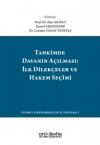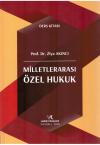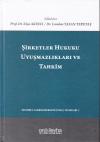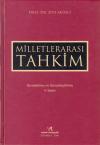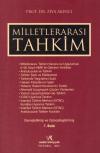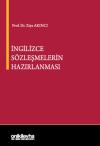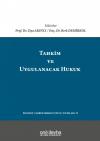
Prof. Dr. Ziya Akıncı
Av. Umut Tuga
Av. Şeref Can Arat
İstanbul Tahkim Merkezi (ISTAC), 'Seri Tahkim', 'Acil Durum Hakemi' ve 'Arabulucu-Hakem (Med-Arb) gibi birçok yeni hukuki kavramı Türkiye'ye kazandırmıştır. Bunun yanı sıra, ISTAC birçok eğitim programı ve bilimsel konferanslar düzenleyerek Türkiye'de tahkimin gelişmesine katkıda bulunmaktadır. İşte Türkiye'de ilk defa düzenlen 'Tahkim ve Psikoloji' konferansı, ISTAC'ın bu alandaki katkılarına güzel bir örnek oluşturmaktadır. Tahkim süreci, uyuşmazlığın çözümlenmesi için tarafların anlaştıkları özel bir yargılama yöntemidir. Bu sürece katılanların davranışları uyuşmazlığın çözümünde ne kadar etkili olmaktadır? İşte bu konferansta sunulan tebliğlerde uzmanlar, psikolojinin tahkime etkisini incelemişlerdir. Sunulan tebliğlerde; tanıkların, avukatların, hakemlerin hatta tahkim kurumlarının davranışlarının, uyuşmazlık hakkında verilecek karar hakkında ne gibi etkileri olacağı tartışılmıştır. Bunun dışında, konferansın Soru-Cevap kısmında katılımcıların sözlü katkıları, "Tartışmalar" başlığı altında bu yayına dahil edilmiştir.(ÖNSÖZDEN)Istanbul Arbitration Center (ISTAC), has brought many new legal concepts such as "Fast Track Arbitration", "Emergency Arbitration", and "Mediation-Arbitration" (Med-Arb) to the legal practice in Turkey. Moreover, by organizing multiple training programs and conferences, ISTAC has contributed to the flourishing of arbitration in Turkey. The "Arbitration and Psychology" conference, which has been held for the first time in Turkey, constitutes a fine example of ISTAC's contributions in this area. Arbitration is a special dispute resolution process in which the parties agree to resolve the dispute. How do the behaviors of those involved in this process affect the dispute resolution process? In the articles presented at this conference, experts have examined the effects of psychology on the arbitration process. In the articles presented here, how the witnesses', lawyers', arbitrators', and even arbitration institutions' behavior would affect the decision to be made on the dispute has been discussed. The oral contributions of the participants in the Q&A sessions of the conference have also been included in this publication under the heading "Discussions".(FROM THE PREFACE)
İÇİNDEKİLER
BİRİNCİ BÖLÜM
TEBLİĞ ve TARTIŞMALARIN TÜRKÇE TERCÜMELERİ
PANEL I
Sunumlar ve Tartışmalar
§ 1. Tahkim Kurumu Açısından Duruşma Psikolojisi
Prof. Dr. Ziya Akıncı
§ 2. Tanık Hafızasının Güvenilirliği
Dr. Ragnar Harbst
§3. Kara Kutunun İçinde: Psikoloji Tahkim Duruşmasını Nasıl Etkiler
Leslie Ellis, Ph.D.
§ 4. Tartışmalar
PANEL II
Sunumlar ve Tartışmalar
§5. Tahkim Prosedürüne Verimini Geri Kazandırmakta Psikolojinin Etkisi
Giacomo Rojas Elgueta
§ 6. Taraf Vekili Psikolojisi
Laurence Shore (Federico Alberto Cabona'nun katkıları ile)
§ 7. Tartışmalar
PANEL III
Sunumlar ve Tartışmalar
§ 8. Hakemlerin Zihnine Giden Kısayol
Paolo MARZOLINI
§ 9. Tartışmalar
TABLE OF CONTENT
SECOND CHAPTER
ORIGINAL VERSIONS OF THE PRESENTATIONS & DISCUSSIONS
PANEL I
The Psychology of Fact Witnesses Presentations and Discussion
§ 10. The Hearing Psychology from the Perspective of Arbitral Institution
Prof. Dr. Ziya Akıncı
§ 11. The (In)accuracy of Witness Memory
Dr. Ragnar Harbst
§ 12. Inside the Black Box: How Psychology Informs the Arbitration Hearing
Leslie Ellis, Ph.D.
§ 13. Discussion
PANEL II
The Psychology of Counsel
Presentations and Discussion
§ 14. The Relevance of Psychology in Restoring Arbitration Procedural Efficiency
Giacomo Rojas ELGUETA
§ 15. The Psychology of Counsel
Laurence Shore with the assistance of Federico Alberto Cabona
§ 16. Discussion
PANEL III
The Psychology of Arbitrators
Presentations and Discussion
§ 17. A Shortcut to the Arbitrators' Mind
Paolo Marzolini
§ 18. Discussion
Prof. Dr. Ziya Akıncı
Av. Umut Tuga
Av. Şeref Can Arat
İstanbul Tahkim Merkezi (ISTAC), 'Seri Tahkim', 'Acil Durum Hakemi' ve 'Arabulucu-Hakem (Med-Arb) gibi birçok yeni hukuki kavramı Türkiye'ye kazandırmıştır. Bunun yanı sıra, ISTAC birçok eğitim programı ve bilimsel konferanslar düzenleyerek Türkiye'de tahkimin gelişmesine katkıda bulunmaktadır. İşte Türkiye'de ilk defa düzenlen 'Tahkim ve Psikoloji' konferansı, ISTAC'ın bu alandaki katkılarına güzel bir örnek oluşturmaktadır. Tahkim süreci, uyuşmazlığın çözümlenmesi için tarafların anlaştıkları özel bir yargılama yöntemidir. Bu sürece katılanların davranışları uyuşmazlığın çözümünde ne kadar etkili olmaktadır? İşte bu konferansta sunulan tebliğlerde uzmanlar, psikolojinin tahkime etkisini incelemişlerdir. Sunulan tebliğlerde; tanıkların, avukatların, hakemlerin hatta tahkim kurumlarının davranışlarının, uyuşmazlık hakkında verilecek karar hakkında ne gibi etkileri olacağı tartışılmıştır. Bunun dışında, konferansın Soru-Cevap kısmında katılımcıların sözlü katkıları, "Tartışmalar" başlığı altında bu yayına dahil edilmiştir.(ÖNSÖZDEN)Istanbul Arbitration Center (ISTAC), has brought many new legal concepts such as "Fast Track Arbitration", "Emergency Arbitration", and "Mediation-Arbitration" (Med-Arb) to the legal practice in Turkey. Moreover, by organizing multiple training programs and conferences, ISTAC has contributed to the flourishing of arbitration in Turkey. The "Arbitration and Psychology" conference, which has been held for the first time in Turkey, constitutes a fine example of ISTAC's contributions in this area. Arbitration is a special dispute resolution process in which the parties agree to resolve the dispute. How do the behaviors of those involved in this process affect the dispute resolution process? In the articles presented at this conference, experts have examined the effects of psychology on the arbitration process. In the articles presented here, how the witnesses', lawyers', arbitrators', and even arbitration institutions' behavior would affect the decision to be made on the dispute has been discussed. The oral contributions of the participants in the Q&A sessions of the conference have also been included in this publication under the heading "Discussions".(FROM THE PREFACE)
İÇİNDEKİLER
BİRİNCİ BÖLÜM
TEBLİĞ ve TARTIŞMALARIN TÜRKÇE TERCÜMELERİ
PANEL I
Sunumlar ve Tartışmalar
§ 1. Tahkim Kurumu Açısından Duruşma Psikolojisi
Prof. Dr. Ziya Akıncı
§ 2. Tanık Hafızasının Güvenilirliği
Dr. Ragnar Harbst
§3. Kara Kutunun İçinde: Psikoloji Tahkim Duruşmasını Nasıl Etkiler
Leslie Ellis, Ph.D.
§ 4. Tartışmalar
PANEL II
Sunumlar ve Tartışmalar
§5. Tahkim Prosedürüne Verimini Geri Kazandırmakta Psikolojinin Etkisi
Giacomo Rojas Elgueta
§ 6. Taraf Vekili Psikolojisi
Laurence Shore (Federico Alberto Cabona'nun katkıları ile)
§ 7. Tartışmalar
PANEL III
Sunumlar ve Tartışmalar
§ 8. Hakemlerin Zihnine Giden Kısayol
Paolo MARZOLINI
§ 9. Tartışmalar
TABLE OF CONTENT
SECOND CHAPTER
ORIGINAL VERSIONS OF THE PRESENTATIONS & DISCUSSIONS
PANEL I
The Psychology of Fact Witnesses Presentations and Discussion
§ 10. The Hearing Psychology from the Perspective of Arbitral Institution
Prof. Dr. Ziya Akıncı
§ 11. The (In)accuracy of Witness Memory
Dr. Ragnar Harbst
§ 12. Inside the Black Box: How Psychology Informs the Arbitration Hearing
Leslie Ellis, Ph.D.
§ 13. Discussion
PANEL II
The Psychology of Counsel
Presentations and Discussion
§ 14. The Relevance of Psychology in Restoring Arbitration Procedural Efficiency
Giacomo Rojas ELGUETA
§ 15. The Psychology of Counsel
Laurence Shore with the assistance of Federico Alberto Cabona
§ 16. Discussion
PANEL III
The Psychology of Arbitrators
Presentations and Discussion
§ 17. A Shortcut to the Arbitrators' Mind
Paolo Marzolini
§ 18. Discussion
| Taksit Sayısı | Taksit tutarı | Genel Toplam |
|---|---|---|
| Tek Çekim | 384,75 | 384,75 |
| Taksit Sayısı | Taksit tutarı | Genel Toplam |
|---|---|---|
| Tek Çekim | 384,75 | 384,75 |
| Taksit Sayısı | Taksit tutarı | Genel Toplam |
|---|---|---|
| Tek Çekim | 384,75 | 384,75 |
| Taksit Sayısı | Taksit tutarı | Genel Toplam |
|---|---|---|
| Tek Çekim | 384,75 | 384,75 |
| Taksit Sayısı | Taksit tutarı | Genel Toplam |
|---|---|---|
| Tek Çekim | 384,75 | 384,75 |




